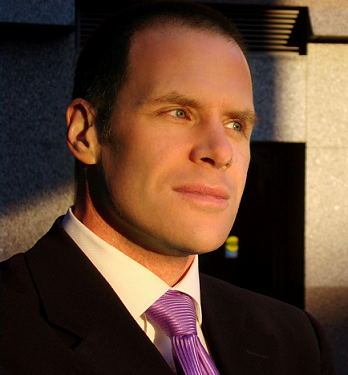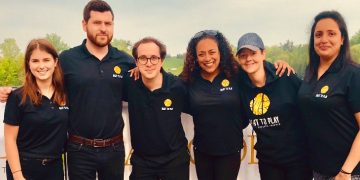Paul Fairlie the President and CEO of Paul Fairlie Consulting
The science and social imperative of meaningful work: Have we reached a tipping point? That’s the question Paul Fairlie is answering with his research. As a work psychologist Paul has delved into the inner workings of employee engagement and he’s found that meaningful work and having positive social impact are having a positive effect on employee and organizational performance. All to say, meaningful work matters, big time.
What does your job entail including what a typical day might be like?
I’m a work psychologist, and there is no typical day (thankfully). Essentially, I use behavioural science to help organizations identify, select, develop, and motivate talent, as well as design how people work. Some days, I do research. Other days, it’s ‘big data’ analyses with company data. Sometimes I’m with clients or speaking. I’m ramping up executive coaching in the future. I also teach at the School of HRM at York University one day a week. I’m self-employed, so some ‘typical days’ are spent artistically – playing guitar and drums. I just got back to recording music after a long hiatus, with a CD in the works. Poetry slams are next. Getting back to meditation. I’m a closet hippie with nice suits. It’s all about balance, Baby!
Can you briefly describe your career path and how you got your current job?
I did several tours of duty in consulting firms over the years. I was the ‘people measurement’ guy (or geek). Psychometrics, research, and data analysis. I came to believe that there were two serious shortcomings in the consulting industry. One, client work was not always rigorous or evidence-based. Think astrology or voodoo. Two, talent management solutions were not well-informed by what really matters to employees as people. Somewhere along the way, we forgot about models of human meaning and basic psychological needs in the workplace. The big epiphany for me was finding out that these ‘head’ and ‘heart’ approaches were not at odds with one another. Science-based ways of meeting people’s fundamental needs and providing meaningful work are showing some of the biggest impacts on employee and organizational performance. It’s a win-win. I had to bust out. So I started my own company in 2008.
What’s the coolest part about your job and what’s the biggest challenge?
Way too many mucho cool things to mention. One of them harks back to science and meaning. Senior leaders are human beings, so they also happen to be parents, spouses, community members, and little league coaches. When you tell them that they can leverage their people to do great things by dialing into what we’re all striving for in our lives, AND…that it’s backed by science, it’s a great re-assurance for them. They can be authentic and still impact the bottom line. If a leader is strictly ROI-based and less interested in engaging employees, no problem. If a leader is humanistic and wants to have social impacts, no problem. It’s all the same.
The biggest challenge is getting employers to question traditional, ingrained ways of leveraging human capital that don’t work. Management fads and folk wisdom are also challenges. It’s tough, sometimes, selling the results of hundreds of peer-reviewed studies that contradict popular press and best-selling ‘biz books’.
What advice would you give to a job seeker looking for meaningful work?
Self-awareness is a key starting point. What is your personality? Your strengths? Your motives? Your passions? Do some assessments. Ask people that know you. Make sure that you’re well-fitted to future jobs and employers. However, you and your supervisor can also re-design a current job to be more meaningful through a technique called job-crafting. Meaning is also a state of mind, so you can find new meaning in your current job by seeing it from a different perspective (You: “I have no autonomy in my job.” Co-Worker: “Are you kidding me? It’s all throughout our job description. Have you tried to exercise that?”). Finally, you may have to wait for more meaningful work as you acquire more experience and status. It does gets better. Some day, you’ll be a seasoned expert, and people may pay you to do what you’ve come to love.
What can you identify as the biggest opportunity in your sector right now?
Where to begin? People, communities, organizations, and the world are undergoing significant changes. We want positive social change, everywhere, and a greater number of pro-social and responsible businesses are poised to support these changes through the ‘new capitalism’. We can only do this through employees, as people, so we have to understand basic psychological needs in the workplace. In national polls, those same people are reporting the lowest levels of job satisfaction and work ethic in decades, but also increasing needs for meaningful work. There’s also been an explosion of research on the impacts of providing meaningful work. What has emerged as the most important facet of meaningful work? It’s having positive social impacts through your job (see ‘positive social change’ above). We may have reached a tipping point in the importance of meaningful work, both as a desire, and as a conduit for positive change.
To respond to these opportunities, I’m re-launching my company this year as a business-social venture hybrid, and as a hub of like-minded consultants who want to impact people both inside and outside of organizations in ways that also lead to extraordinary performance. It will be founded on positive organizational science, and two survey tools, the Positive Person Inventory® and the Positive Work Inventory®, will be used to help audit positive people and work within organizations. The latter was recently launched Here in an introductory offer through Self-Management Group. Employers can find more information Here.
Bio
Paul is president and CEO of Paul Fairlie Consulting, with over 20 years of experience in organizational, market, and opinion research and consulting. He has a PhD in psychology, and as a work psychologist, he’s helped organizations to identify, select, develop, and motivate talent, as well as design how people work. He is also an adjunct professor in the School of Human Resource Management at York University.
Ultimately, Paul helps organizations to succeed by addressing what really matters to people, by going back to models of psychological meaning and fundamental needs to inform products and services, meaningful workplaces, and ultimately, positive change in the world. Paul has returned, again and again, to the notion that effective organizations start with an understanding of what human beings are ultimately striving for in their lives. Paul’s approach is highly informed by evidence-based positive psychology. This is embodied in his Positive Work Inventory® and Positive Person Inventory®, which measure positive work and people, respectively, within organizations.





No Comment